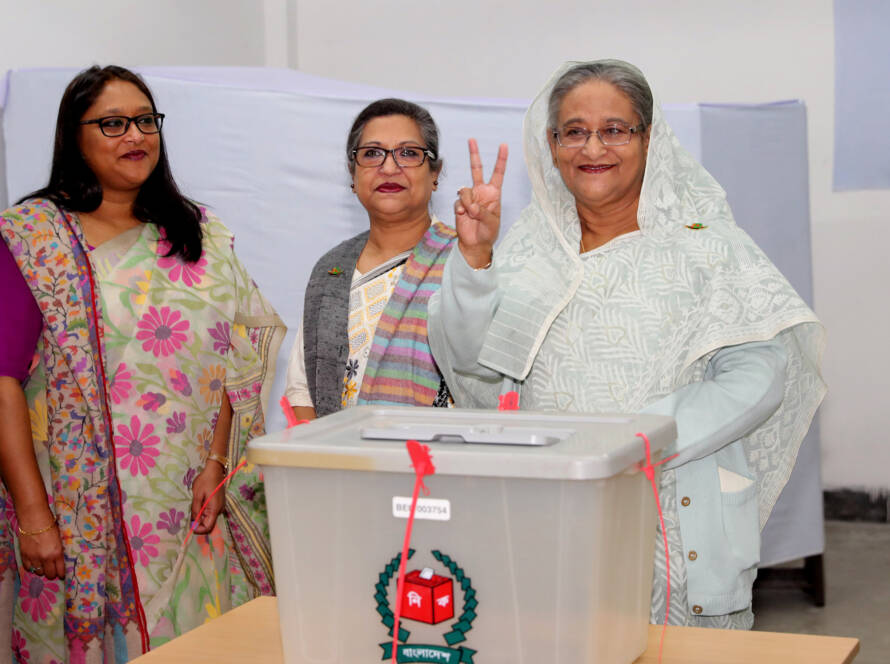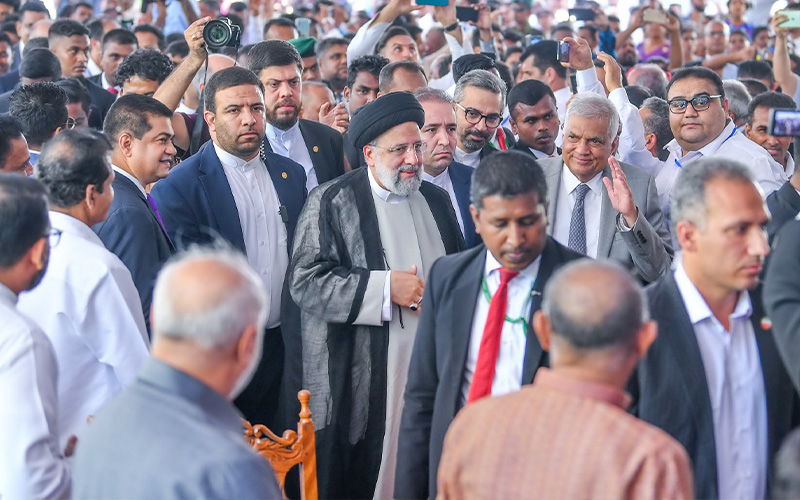By Uditha Devapriya with Nevindi Jayawardana and Dilshan Bataduwaarachchi
By the time Pakistanis headed for elections on February 8, Imran Khan had been served a 14-year jail sentence, on top of other charges and allegations. Barely a week earlier, Khan, the country’s most popular Opposition figure, had been disqualified from holding office for 10 years. His party, the Pakistan Tehreek-e-Insaf (PTI), had been subjected to mass coercion and suppression, its central offices sealed by police.
The odds were heavily against the party, and against its leader. Yet Khan managed to defy them. Despite allegations of vote rigging and military intervention and despite all bets being in the government’s favor, the PTI won 93 seats. The ruling party, the Pakistan Muslim League-Nawaz (PMLN), won 75 seats, while the Pakistan People’s Party (PPP), headed by Benazir Bhutto’s son Bilawal Bhutto Zardari, secured 54.
Khan’s victory is significant, and is a stark contrast to Bangladesh, where the incumbent secured a fifth consecutive term, and India, where the BJP is tipped to win big in April. Yet what is more significant is what followed after the victory.
In January the PTI accused the government, led by Shehbaz Sharif, of enforcing an internet outage to sabotage its online election campaign. With the police banning the PTI from holding rallies and the government imposing internet shutdowns, Khan’s supporters were forced to resort to social media, prominently TikTok.
Following his historic win, Khan’s supporters published his victory speech online. The one minute 30 second video opens with a somewhat flustered Khan. Clad in his characteristic sadri and kurta, he thanks his supporters and congratulates them for defying restrictions, imploring Pakistanis in general to “Protect your Vote.”
By all accounts, this looks and sounds like an ordinary victory speech. But it’s not. Khan is there in the video for a few seconds. After a point, the words don’t match the movement on his lips. And something seems wrong, almost offbeat, about the voice.
That’s because it’s not Khan’s voice. What you are seeing, or rather hearing, is the first political victory speech generated through AI in South Asia.
This was hardly the first time the PTI resorted to AI. Last December the party used a similar clip at a virtual rally. The clip, which displayed an AI generated image, drew almost 1.5 million views on YouTube. By then the government had banned mainstream media from publicizing Khan or using images of him. Slapped with one allegation after another, he had been tabooed from any media platform.
The PTI put up a good fight against this. In a country where the military has historically intervened in civilian affairs, ensuring a smooth ride for ruling parties, however, the odds were not in its favor. Yet it turned the tables on the government. It did that by engineering perhaps the most innovative electoral strategy in South Asia.
Its modus operandi was simple. While talking with his lawyers, Khan would dictate and pass notes on certain themes. These would then be passed down to his supporters, who would quickly use them to generate AI speeches at digital election rallies on TikTok. At the same time, the party opened a chatbot on Khan’s Facebook page, providing information about election candidates. Through these easy yet effective channels, the PTI managed to rout the government and military without needing to go underground.
South Asia is of course no stranger to AI-dominated politics and campaigns. Narendra Modi’s BJP, for instance, has been using it for some time.
But AI has not always been used by ruling parties. Nor has it been used for elections alone. Deepfakes, for instance, have become the new rage in South Asia. From the daughter of a terrorist leader to a much-loved South Indian political icon, deepfakes have been used to resurrect the dead. What Khan has done is to take this to the next logical step: employing AI to resurrect, and re-legitimize, jailed Opposition figures.
What, then, are the implications of this for the future of South Asian politics? First, it shows quite clearly that South Asia’s traditional soft-authoritarian political model is no match for social media and AI. In Pakistan’s case, not even a palpably strong relationship between the government and the military could prevent the Opposition from tapping into TikTok and Facebook. The government imposed internet shutdowns, targeting the PTI. But all that did was to push the party to other channels and platforms.
Second, it underlies a pivotal generational shift. The Sharif government used all the tools it had to blacklist the PTI, but it did so without reckoning with the youth, vast swathes of whom voted for Khan and enabled him to score the biggest election surprise in Pakistan’s post-independence history. In a pattern reminiscent of other South Asian countries, this youth is deserting the mainstream media and has rejected the personality cults and dynastic politics that mainstream media have been reinforcing for decades.
In light of such shifts, it’s not the medium, but the message put across, that matters. Khan and Sharif had equal access to AI and social media. Yet Sharif was seen as an bombastic, self-centered egotist, while Khan was looked up to as the more progressive candidate, an underdog concerned with issues ailing the country and economy. Simply put, it wasn’t just Khan’s use of AI that helped him secure his victory; it was also what he spoke about. As one analyst put it very aptly, “The old playbook won’t do anymore.”
Third, it shows that democracy is no longer restricted to traditional media, and access to the traditional media no longer determines election outcomes. AI, in that sense, has become something of a political leveler. This is the first time, in the region and quite possibly the world, that an Opposition party has used AI to score an election victory. That most likely reason was that Pakistanis were tired of establishment politics, tired of the dynastic cults that both the government and the Bhutto-led PPP had entrenched in the system.
This is an important point. Amidst economic recession and geopolitical turmoil in the region, South Asians are expressing disgust with incumbent parties. The challenge for Opposition outfits is how to keep their anger at “the system” within a democratic framework. The Pakistan elections is a classic example of that: while the Sharif government did all it could to delegitimize the PTI, the PTI used one out-of-the-box tactic after another to upend it while reinforcing confidence in electoral politics, in effect squaring the circle.
For obvious reasons, such strategies work best in countries that have a culture of electoral politics, even those with soft-authoritarian systems in place, as in much of South Asia. They will not work in hard-authoritarian settings, certainly not in countries that have imposed bans on social media, as in Myanmar. While censorship, even of the sort imposed by the Pakistani government, will do little to deter Opposition parties from resorting to TikTok and AI, or deepfakes, complete bans will render such platforms useless.
That brings us to the fourth and most important point. Concerns have been raised about how AI can lead to disinformation, misinformation, and hate speech across the political spectrum. While countries like Sri Lanka have yet to experience this, tech companies have been fighting an uphill battle in India.
The PTI’s strategies admittedly reaped dividends. They benefited an Opposition party that had been tabooed and persecuted by the government, even if Khan is seen, and not unjustifiably, as a demagogue, whose performance as Prime Minister on the economic and corruption front did leave much to be desired. Yet, in the long run, AI can be a double-edged sword. While it may have helped the PTI to secure victory and defy a corrupt and authoritarian government, corrupt and authoritarian governments can themselves take a leaf from its book and play the same game elsewhere. At a time when AI technologies have given rise to numerous political storms, this seems to be a valid concern, especially given the PTI’s and Khan’s own inclination for populist taglines like “London Plot Failed” on their campaign trail and victory speech video.
It is possible that these fears have been overstated. While AI can undermine democratic politics, especially in divisive political environments such as in South Asia, AI platforms ultimately depend on the data that is fed to it. They also depend on advancements in other fields, including mainstream media. South Asia, or even South-East Asia, has not advanced enough on these fronts for AI to pose a big risk to electoral politics. The situation is different in other countries, particularly in the West.
That is not to underestimate the potential of AI to disrupt mainstream politics. Imran Khan’s victory reveals that digital technologies need not be the preserve of the establishment and that theycan be used to mobilize, and empower, dissidents. The danger lies in the message, not the medium. AI can play a big role in promoting anti-establishment politics. But as recent elections in Argentina show, it can also be used to spread disinformation. Whether South Asia has come to that stage remains to be seen. At one level, Khan’s victory appears to have taken the region one small step in that direction.
Uditha Devapriya is the Chief Analyst – International Relations at Factum and can be reached at uditha@factum.lk.
Nevindi Jayawardana recently graduated from Drexel University in Philadelphia with a BA in Global Studies. She has over two years of experience in the development sector. She has worked on various projects related to advocating for women in the criminal justice system and promoting peace and reconciliation digitally.
Dilshan Bataduwaarachchi is a PhD candidate at the School of Engineering, Deakin University, Geelong, Australia. His research work primarily focuses on artificial intelligence and autonomous control of robotic manipulators.
Factum is an Asia Pacific-focused think tank on International Relations, Tech Cooperation, and Strategic Communications accessible via www.factum.lk.


